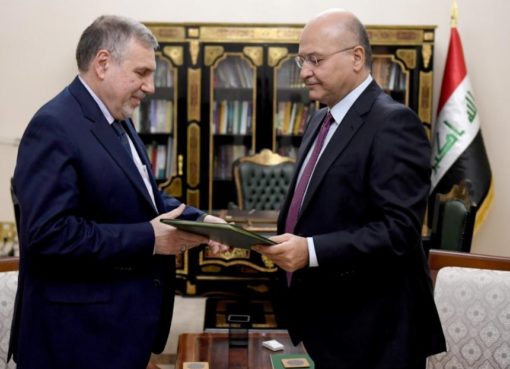The country’s oil revenue could fall as much as 70% in 2020, says the agency
A crippled utilities network was a key factor fuelling protests across Iraqi provinces during summer months, when temperatures can easily reach 50°C. AFP
The International Energy Agency will ‘step up’ its support for Iraq, Opec’s second-largest oil producer as it faces possible delays in implementing critical projects due to the fall in oil prices.
“The prime minister and I agreed that the IEA will step up its support for Iraq on various energy issues, notably electricity and gas,” the agency’s executive director Fatih Birol said in a statement following a phone conversation with Iraq’s new leader Mustafa Al Kadhimi.
“One of the main issues for a fiscally-constrained Iraq is the need to revisit its investment frameworks to ensure critical infrastructure projects don’t grind to a halt for lack of funding,” he added.
Iraq’s net revenue from oil could collapse by as much as 70 per cent this year, as a result of the slowdown in oil demand from the Covid-19 pandemic and supply restrictions in place to rebalance the oil markets, according to the IEA.
“There are preliminary signs that the current downturn in oil prices is already impacting capital budgets in the country. The government has not passed its 2020 budget, and as such, its spending is curtailed at a pro-rated level of 1/12 of realised spending from the previous year,” Ali Al Saffar, energy analyst at the Paris-headquartered agency said in a note.
All capital investments planned by the electricity ministry for this year have been “indefinitely deferred”, he added.
This puts at risk much-needed investment to rehabilitate the country’s war-damaged grid, which has some of the world’s highest transmission and distribution losses.
The delay in the formation of a new government by nearly six months has impacted the implementation of several critical projects.
Rebuilding Iraq’s power infrastructure, damaged by decades of war, is high on the government’s list of priorities. A crippled utility network has been a key factor behind protests across Iraqi provinces during summer months, when temperatures can easily reach 50°C, occasionally requiring government-mandated holidays to cope with the extreme weather.
The electricity ministry planned to raise overall power capacity in Iraq to 22GW by the summer of 2020, Iraq’s outgoing electricity minister Luay Al Khateeb told The National in an earlier interview. The country’s power generation capacity is currently at 19.2GW.
Iraq’s current predicament affects much-needed funding required for an estimated 7,000MW of planned generation capacity expansion, Mr Al Saffar said.
Moving forward, Iraq’s best bet for recovery should be implementing tariff reforms rather than hoping for a recovery in oil prices the IEA said.
Electricity subsidies currently cost Baghdad around $12 billion (Dh44bn) annually.
“Equivalent to around five months of total net revenues at current prices, this burden is particularly acute when the country’s fiscal health is as vulnerable as it is now,” said Mr Al Saffar. “A carefully studied and well-implemented tariff reform should be an urgent priority for a number of reasons.”
Iraq draws nearly 90 per cent of income from the sale of oil. Baghdad, which has failed to adhere to previous Opec+ agreements has pledged to commit to the current pact in place from May onwards. Opec+, an alliance of producers, led by Saudi Arabia and Russia, are cutting 9.7 million barrels per day from the markets in May and June. Tapered restrictions on production will remain in place until 2022.
The issue of production cuts has proved contentious in Iraq, where it remains unpopular as production and sale of oil remains a critical backbone of the country’s economy.
Baghdad said last week it remained “fully committed to the terms of the Opec+ agreement”.
Meanwhile, Mr Al Khateeb also stressed the need for urgent tariff reforms in Iraq during a virtual panel discussion earlier this month organised by the American University of Iraq, Sulaimani which is located in the Kurdistan Region.
He singled out power piracy as a thorn in the side of the government, leading to a revenue loss of $12bn alone last year.
“The challenges that we’re referring [to]… we need to sort out the tariff reform. At the moment we have four million registered units, [of which] 50 per cent of them thrive on power piracy,” he told the panel.
Iraq’s electricity rehabilitation programme, which relies on multinational companies to rebuild damaged utilities, develop new schemes and tackle persistent gas flaring, has dragged following geopolitical tensions earlier this year between the US and Iran, in which Baghdad was caught in the crossfire.
“There has scarcely been a more urgent time for Iraq to pursue crucial reforms in its energy sector to ensure that investment continues even when government revenues have been decimated by low oil prices,” said Mr Al Saffar.
Baghdad’s reliance on state financing for large schemes only increases risks of delay.
“Given how essential both natural gas and electricity are to economic prosperity in Iraq, such delays should be avoided at all costs,” he added.
In April, the US extended a waiver granting continued imports of Iranian electricity last month, following an earlier extension by 30 days.
The waiver allows for a “credible government” to be formed in Iraq, a US state department official told Reuters news agency. The latest waiver expires on May 26 and is shorter than the earlier grants of 90 or 120-day extensions.
Iraq, which is also looking to import electricity from neighbouring Jordan as well as from the regional grid, GCC Interconnection Authority, is likely to continue its reliance on Iranian gas for the foreseeable future.
Source: The National, May 17,2020
https://www.thenational.ae/business/iea-to-step-up-support-for-iraq-s-power-and-gas-sector-1.1020506








Comment here